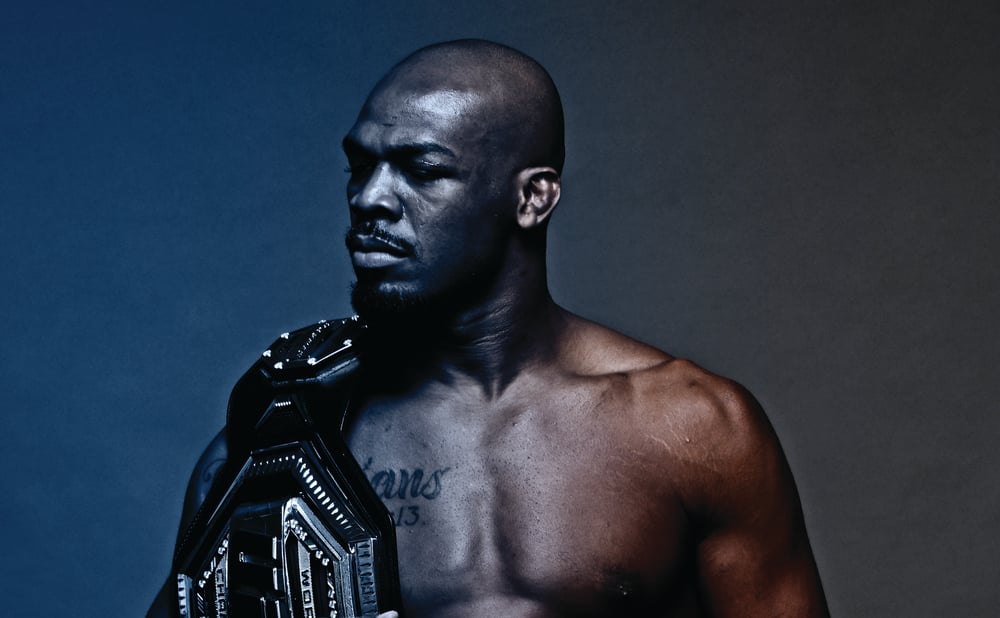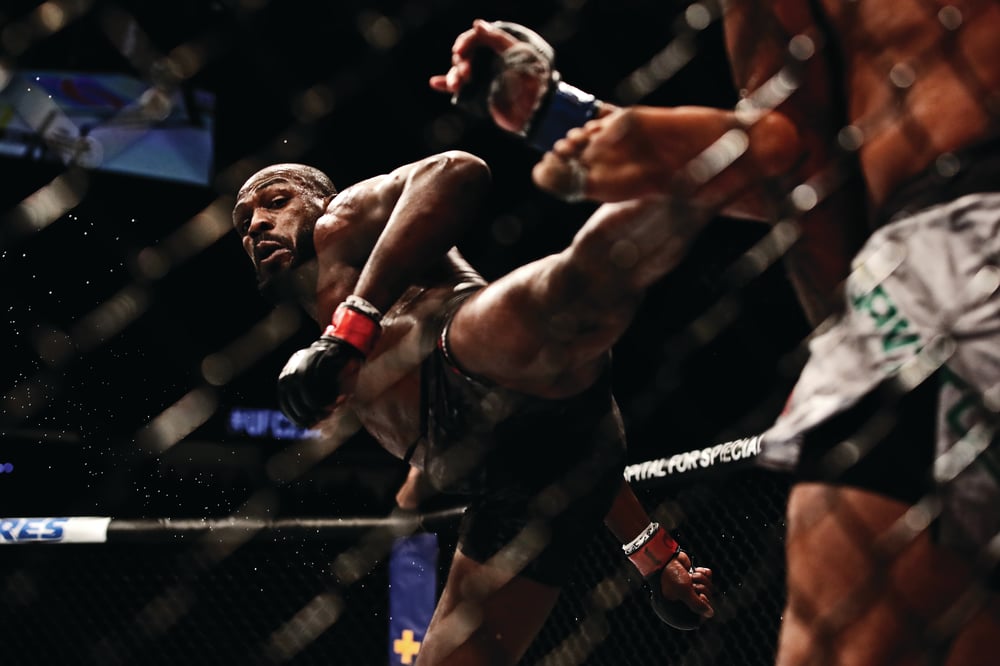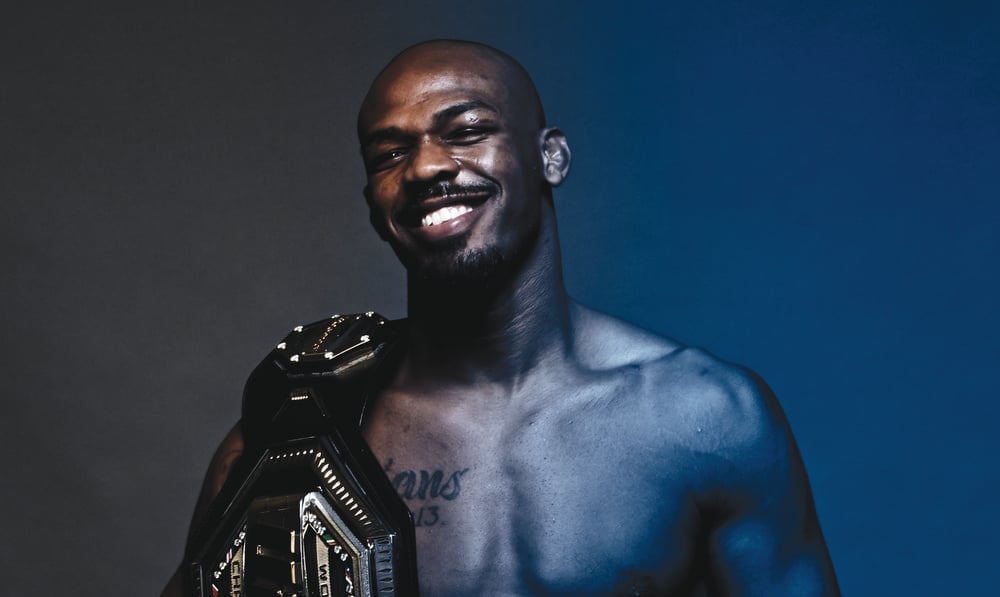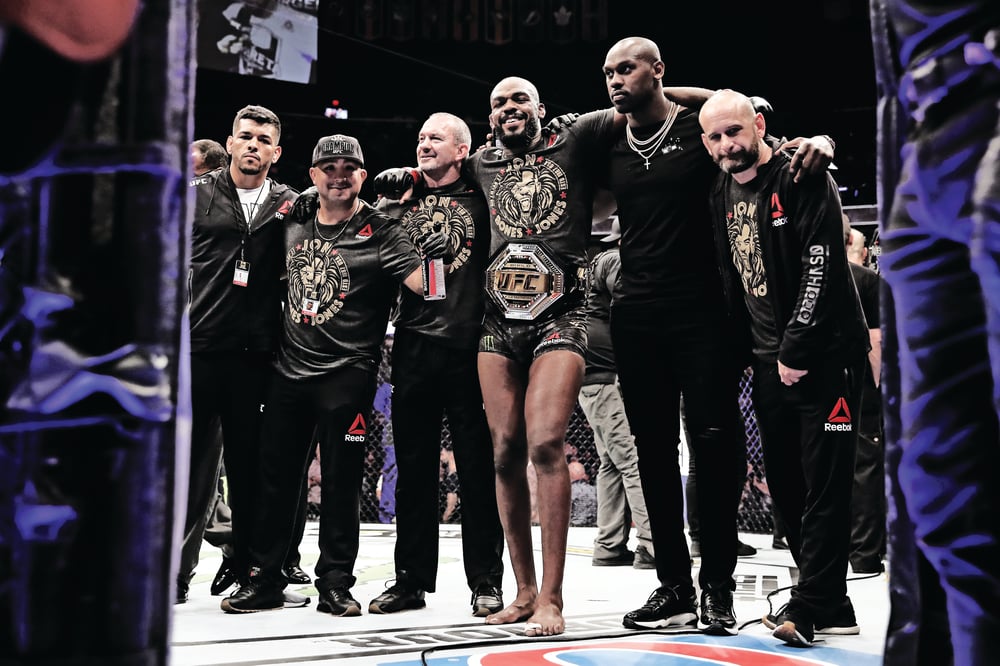
Issue 183
October 2019
How we remember Jon Jones will be determined by his remaining years in the Octagon. Speaking exclusively to Fighters Only, he discusses what lies ahead for the rest of his brilliant career.
Enigmatic. Jon Jones has “a legacy to fulfill” and the Ultimate Fighting Champion’s greatest – yet also most controversial – fighter wants Daniel Cormier to be part of it, if his most despised rival is willing to take him on in a trilogy fight. But the conditions must be right. It is a crossroads time for Jones, now 32, and entering the final phase of his storied career.
Since Jones claimed the UFC’s light heavyweight crown against Shogun Rua in 2011, many moons ago now, the fight league has undergone so many changes, like the fighter himself. Plans are being made with challenges anew. The 6ft 4ins tall fighter with an 85-inch reach and sublime skills has become many things: one of the most important fighters for the UFC, a maligned figure in some corners of the fight world, yet in others, considered one of the greatest ever, if not the greatest.
Not in his mind though, as the fighting artist explains. There is still unfinished business, in spite of him having wiped out an entire generation of the very best at 205 pounds. The debate rages, behind the scenes, on whether that third fight with Cormier can be made – this time at heavyweight.

In some ways, Jones is the nemesis of Cormier. Yet in spite of two triumphs over his compatriot, there is an argument to be made that ‘DC’ is also a nemesis for Jones, given their history together, and the failed drugs tests which have blighted the career of the man known by his fighting sobriquet of ‘Bones’.
On the fight with Cormier, conceivably at heavyweight, which would make it a much greater attraction, Jones explains: “I am interested in fighting Daniel, I just want it under the right terms. One thing about the UFC is we always give the fans the fights they want to see. If they want to see it bad enough, we’ll do it. Fighting at heavyweight, we’d just need the right terms to make it happen. I’m aware it would be a superfight so my view is that I couldn’t fight on the same contract.”
The distinction Jones wants to draw with absolute clarity is between fighting for belts, and fighting for “legacy”. His is an intriguing analysis, and shows his mentality to a tee. “Fighting for a championship fight and fighting for a legacy (are different). A belt is one fight, legacies are forever. Legacies aren’t races, it’s a journey. A championship belt is an event. Legacy is a lifestyle.”
He goes on. “I’m not trying to protect this undefeated record (as a champion). The coaches always tell me, especially Brandon (Gibson), ‘We’re not taking title defenses, we’re taking title offenses’. The key is that we’re out there trying to conquer more, not trying to protect what we already have. There are these young guys coming for us and we can’t be sitting there complacent about it.”
But a third meeting with Cormier drives the fighter, the champion, in him. It will all come down to whether Cormier has it in him at 40 years of age. “I think it would be great for my legacy. Especially since I’ve shared an era with Daniel Cormier. I could squash his a little bit. But I know I can be respected without going up to heavyweight. I can be a 20-time UFC light heavyweight champion. That rings bells and I doubt anyone will be able to do that again soon.”

Without doubt, there is an ambivalence from Jones about the move to heavyweight. It is based on history and the obvious disadvantages he will be creating for himself. There are weight divisions for a reason.
“I feel like if things aren’t broke then we shouldn’t be reaching. I also realize the grass may not be greener on the other side,” he reasons. “Heavyweights hit a lot harder, they get knocked out every other fight. I appreciate having a healthy brain. I’ve got daughters to raise and I know I’m more than a fighter. I just want to take the right fights. Why mess with a good thing? That’s my answer.”
The dislike for Cormier, nonetheless, goes to the core for Jones. It even extends to a team-versus-team outlook for the upcoming battle for lightweight supremacy between the champion Khabib Nurmagomedov and challenger Dustin Poirier in September in the Middle East.
“I’m rooting for Dustin, we work together. He’s one of my business partners. And I quite frankly don’t like Daniel Cormier’s teammates so I’m rooting for Dustin.”
How does Jones see that one? “Khabib is a good wrestler. I’m a wrestler and they often get to dictate where the fight goes, whether that’s standing or not. If I had to bet the house I would lean on Khabib’s side, but I’m hoping Dustin can pull it off.”
Thus far, Jones has conquered every challenge set him – in the Octagon. Outside tit, life has been far more tempestuous. Jones conquering himself has become the biggest battle and has made him a polarizing figure. Yet inside the cage, there is a strong argument that it was Alex Gustafsson, in his first epic encounter with Jones, who gave the UFC’s greatest champion, yet most controversial modern fighter, his toughest test.

It is six years on since that first five-round war, and Jones – having beaten Gus convincingly a second time – can reflect on it a little. Particularly on the fact that he is always prepared to go five rounds. That he learned so much from that tear-up in Toronto.
“Yeah, absolutely,” he agrees. “You know, going into round four in a fight I consider my comfort zone. It’s where mentally I know I have to kick it up and where I know I should be winning. If you watched the Gustafsson fight, it was a dog fight until the champion inside me came out. The spinning back elbow that suddenly changed the fight.”
It is interesting to see Jones look back on such pivotal moments.
Outside the obvious, there are all sorts of possibilities that could be thrown at Jones. Fights in South Africa, Brazil, Europe, even China? Jones is open to them all. “I think that would be very cool. I would be interested in that.”
But Las Vegas is really his home. Las Vegas is always the fighting home of the very best. In recent years, in fight sports, Floyd Mayweather, Manny Pacquiao, Conor McGregor and Jones have been the busiest men in Vegas. Eight times Jones has walked to the Octagon in Sin City.
“Vegas is the fight Mecca. It’s close to home for me. It’s only an hour flight. I had my best friend drive my jeep over with my dog,” explains Jones, revealing how it is a place of comfort for him in fight weeks.
“When I fight, it’s methodical and relaxed. I think Bruce Lee said it best “He extend, I retract.” I want to use my knowledge, and all my techniques, never fight out of anger, or say ‘I’m gonna rip his head off’. It’s all about breaking opponents down.”
Not surprisingly, the list of sportsmen whom ‘Bones’ admired when he was growing up reflects his style of fighting, his athleticism.
“It was Michael Jordan, LeBron James, Muhammad Ali and Bruce Lee.”
In his own sport, it is Anderson Silva. There are many plaudits given to Jones, like Silva recently saying that at his peak, Jones would have beaten him, pound for pound. Jones is at pains to play that down.
“I think that’s Anderson being nice. Anderson at his prime believed he would beat anyone. I’ve always shown respect to Anderson and that’s why he’s shown respect to me. I never want to think about what would happen if we fought. I just want to appreciate his greatness.
“Silva was dynamic, effective, lethal, free-flowing,” Jones continues. "I wouldn’t say it is natural, I think it’s a lot of hard work that over time, it can begin to look natural but it’s a lot of dedication and yeah I just love the effort that he’s put into his mechanics.”

Jones cites the Silva title defense against Chael Sonnen as the one which stands out for him.
“The fight against Chael Sonnen added to Anderson Silva’s legacy of having heart and being a champion” he reasons. “He fought through having a broken rib, and still managed to pull off a victory. Pretty much all of Anderson’s career, even when he wasn’t as technical he’s still just an amazing fighter, lethal.”
Jones, like Silva, has that special quality, the ability to delight fans by fighting others at their own style, and with the skills to make it look effortless. Jones could simply not ever contemplate fighting a 44-year-old Silva.
“Anderson is such a wizard, I think my best chance would have been to take him down. But like I said, there’s no interest in that fight because it’s never going to happen.”
“I don’t feel I’m the best ever. I feel I have a lot to prove. If I can continue to win fights and retire. Anderson Silva is the best ever. I’ll leave it at that.”
The 2011 Jon Jones is very different from the 2019 version.
“2011 Jon was a lot wilder and younger. Felt invincible. He wasn’t as appreciative. Today I know I’m very human and I’ve made a lot of mistakes. I know you can lose it all, so I’ll do the right thing. I’m trying to allow my character to catch up to my talents.”
But Jones is intent on staying on top in the sport. How will he manage that?
“I think through faith, belief. Aligning yourself with the right people. That’s it.”
Jones explains: “I do feel like I’m getting better. The reason I feel that way is because of my team, the people around me. I feel I’m becoming a better leader. I’m trying to bring out the best of the guys around me. The more I care and the more they care and bring out the best in me. I’m truly blessed to be with people who truly care about me. I’ve accumulated possibly the best mixed martial arts team that’s ever existed.”
The key, reckons Jones is that he retains “a child-like attitude at my gym”.
“I’m not the champ when I walk into Greg Jackson’s gym,” he said.
Brandon Gibson, Greg Jackson and Mike Winkeljohn are close friends as well as coaches to Jones. I spoke to Gibson and Jackson about the trials, tribulations and successes they enjoy together.
“Everybody can stumble. One thing I will say, I think Jon’s greatest attribute is his defense,” explains Gibson. “Everyone likes to show his highlight reel, but defensively it’s rare he gets hit. He has fantastic, keen abilities with range, angles, distance and patterns.”

But what about the step up to the heavyweight division?
“I think there’s interesting arguments for each. Him against Ngannou is a great fight. The public wants to see Jon take on greater challenges. In this era, all these double champs, I feel like it’s almost expected. Jon wants to make a legacy as the greatest champion of all time, the greatest light heavyweight of all time and the greatest fighter of all time. Can he do that by being a double champ? I think so.”
But being a double-champ, as we have seen with other fighters, has a tendency to be temporary.
“Very much so,” agrees Gibson. “I think it’s fight specific. If there’s an intriguing match up, that’ll motivate him. I think Brock Lesnar was at one point, not that that’s an option anymore. I do think he’d be interested in that. Right now, all our goals are at light heavyweight.”
What there is for Jones, at his training base in Albuquerque, is a very close bond with his team.
“It’s a brotherhood, a kinship for sure. It goes so much deeper than the fight game. We’ve shared so many times together, and hard times together. We’ve always been there for each other as friends and brothers. He genuinely appreciates us in all our roles and capacities.”
When Jones has come under fire, his team have been extremely important for him. Indeed, for six years, between 2013 and 2018, Jones fought just once a year. His world has imploded at times, the shackles have come off in the worst way possible, and it must have been a dark place for the fighter.

“We’ll circle the wagons around Jon when we need to,” Gibson concurs. “We’ll be the first line of defense oftentimes. I feel in fight weeks, it’s our job to push him up and elevate him as much as we can.”
Does he get nervous?
“I think it’s part of the natural process to let nerves and fears arise during this process in combat sports. From the camp to the fight we cover all the bases to the fight week to stay confident and stay the course. One thing with all the success we’ve had is we know the course. We continue to push each other and nobody is complacent. Everyone is hungrier and hungrier as a team.”
Yet Jones, reckons Gibson, has a wonderful asset: the ability to be present.
“Jon was saying he worked so hard to actively never lose focus during his fights. It’s an awareness. He’ll see where everybody is in the crowd and be aware of his coaches, but not for a split second will he lose awareness on the range and distance and pace and pressure – everything encompasses the fight.”
“One of the areas of Jon’s brilliance is his ability to establish patterns and break patterns. That’s a big part of our camps. Set rhythms and find dynamic ways to take advantage of these things. We’re very well aware, but we get caught in our rhythms as coaches sometimes. We’re aware of what worked before. So we’re trying to push ourselves and challenge ourselves, to be our own critics so we can continue to evolve. Jon has so many tools. His repertoire is deeper than any mixed martial artist. We’re not happy or satisfied, we want to continue to grow.”
Greg Jackson goes even further, in that inimitable way the coach has of describing mindsets for his fighters. Over the years, Jones has clearly become Jackson’s greatest pupil.
“He’s get into a kind of zen flow experience,” Jackson explains. “His fight IQ is extremely high when he does that. I think he makes the right decisions at the right time. His brain is hardwired to do the correct thing at the correct time. Whether that’s a slowing, the ability to do that is a talent and he can do that.”
So what is Jackson’s take on Jones going up to heavyweight for the stiffest of challenges, against the likes of Cormier, Stipe Miocic, Francis Ngannou and others, fighters who would have a clear weight advantage against him?
“Staying at light heavyweight is maybe what he wants to do. But we’ll take each challenge as it comes. My job is just to figure out the puzzle. I could try to figure out heavyweight puzzles. He’s my guy, so of course I think he can beat them. I think he’ll be at heavyweight. On his best day he can beat anybody in the world.”
Jones has told me that he has always been “grateful for the negativity” that it makes him “sharper”, but behind it all, he is human, and though poker-faced, suffers from all the other frailties that fighters must deal with.
But cementing the legacy remains the objective.
“How does it end? We’re still working on that. We’re still working on how the movie ends. Every day I wake up with the choice to try and be a good dude. I know there’s a lot of pits you can fall into. I’m just trying to be a better dude. If I do good every day, I’ll be OK.”
The key is keeping that tight team, having faith in those who have brought him this far.
“I feel like I don’t bring people into my life too often. I kick it up a lot during fight week, because that’s when people give a damn. I definitely enjoy my privacy. I try to raise my daughters as normally as possible. On the week of the fight is when people want to see me and know what I’m feeling, so I try to do that as much as possible.”
Even on the Thursday before his last fight against Thiago Santos at UFC 239, Jones had taken his daughters down The Strip to see the fireworks display on the Fourth of July.
During International Fight Week in July I asked Jones whether he was “a good guy trying to be bad, or bad guy trying to be good” and his answer made many headlines.
“It’s a good question. I think I’m a bad guy that’s trying to be good. Just because religiously, we’re all sinners. We’re born into sin. It’s our nature to sin. It’s a decision to try and do the right thing, even when no one is looking. I think all of us as humans, none of us are shit and it’s our choice to be more than that. I have to say I lean closer to being a perfect human that’s trying to do the right things and do good.”
Enigmatic, as ever. And that is unlikely ever to change. Right down to the bones of Jones.
...









